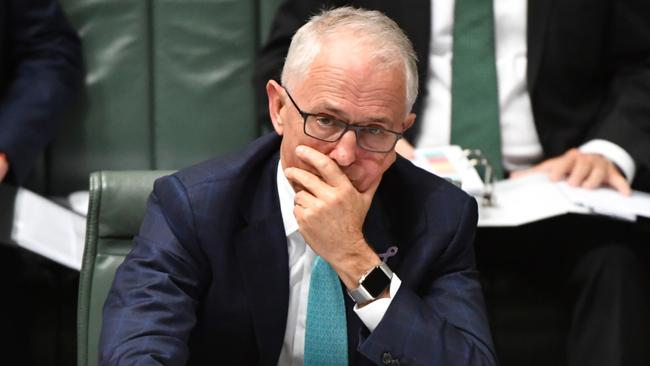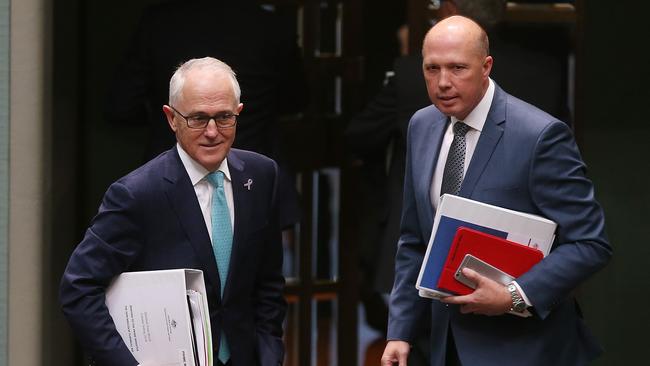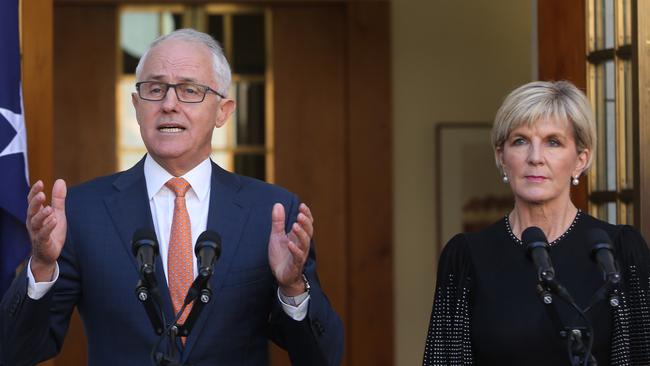
This is not just about personalities. The crisis within the Liberal Party is permanent and deep-seated. As an institution it is now incapable of unity around a common agenda. It is riven by disputes about the policies it needs to succeed and what the Liberal Party represents.
The lesson from the focus on the 30th Newspoll loss for Malcolm Turnbull is that the leadership story will run until the next election — and it will keep running beyond it. Julie Bishop and Peter Dutton are seen as banner-carriers into the next political cycle of the ideological war between progressives and conservatives.
The brawl over energy policy has morphed into a dispute over core belief. With Tony Abbott calling for “strong-arming” and forcible acquisition of the AGL Liddell power station — after demanding the previous week the government build a new coal-fired power plant — the Prime Minister and Energy Minister Josh Frydenberg hit back by invoking RG Menzies and his crusade against nationalisation to chastise Abbott for breaching essential Liberal values.
The Liberals are split over what they stand for in government. The conservatives accuse Turnbull of having the wrong policies. They want him to commit to “ownership” of big coal, cut immigration, cut renewable subsidies, cut spending, fight on cultural issues, build more policy discrimination from Labor and pitch to alienated conservative voters.
Yet an overwhelming majority of the cabinet — not just Turnbull — would reject such a package. The party is turning on itself in a spectacular and public fashion. The leadership issue will keep running not just because Turnbull rejects the conservative mantra. Ultimately, this is not about what Turnbull says or does — it is about what he represents.
It is about the past and the future. The beating impulse remains Turnbull’s political assassination of Abbott in September 2015, a wound still bleeding. The conservative vision is that Turnbull cannot win — because he is a progressive leading a conservative party — and hence is doomed. Guess what? If you assume you must lose an election, you will lose.

The biggest miscalculation by Turnbull and his backers in 2015 was underestimating the transaction price for destroying a first-term prime minister. It is exactly the miscalculation Labor made in 2010, when Julia Gillard chose to blow up Kevin Rudd and never recovered as PM.
Yet our self-destructive culture is on daily display as the anti-Turnbull Liberals and their media allies demand yet another political assassination of a leader in the name of saving the government and in blind defiance of what would be the disastrous transaction costs.
Here is the conundrum — the Liberals, after the symbolic 30th Newspoll, cannot remove Turnbull yet they cannot accept him. We were told last year the showdown would come before Christmas; then we were told it would be triggered by the 30th Newspoll; now we are told the showdown will come in six months.
You get the point: the liquidation of Turnbull must always be coming. It exists as a story because it must exist. And everyone knows how this ends: a party divided against itself cannot stand.
Understand what the 30th Newspoll represents. It shows the Liberals cannot liberate themselves from the events of September 2015. They are obsessed about themselves. Sure, the symbolism is powerful: Turnbull should be held to account because he now fails the test on which he judged Abbott. Turnbull now says he made a mistake at the time in invoking Newspoll. Of course he must say this, but it doesn’t matter. The real point is that the Liberals cannot get over it.
And they have persuaded much of the media the biggest story in politics is Liberal strife. It is a frustrating and convenient story because it is all headlines though nothing ever happens — it is a story in permanent anticipation of an event. But Turnbull’s removal is plagued by embarrassing realities.
There is no challenger — not the way Gillard was the alternative to Rudd, Rudd was the alternative to Gillard and Turnbull was the alternative to Abbott. There is no figure either the party or the public agrees upon as the alternative leader. This is the first political and media campaign I have seen to remove a prime minister when the advocates have no candidate — that is serious innovation. The unknown leader-in-waiting is assumed to be superior to Turnbull.
What they never tell you is that Abbott has made it clear he won’t challenge Turnbull. This is an important principle. It is noteworthy that Barnaby Joyce on Monday did not advocate the “rolling” of Turnbull; he advocated that Turnbull be “honourable” and resign before Christmas rather than drive the party “off a cliff”. Abbott yesterday was on the same message — saying Turnbull would know six months out if he could win the election. Turnbull won’t resign but such calls reflect core realities.

These are that it is ludicrous to pretend the government would emerge in a better position after the bitter political assassination of Turnbull and then a bitter leadership contest over his successor. Hence the convenient necessity of Turnbull falling on his sword.
The public, meanwhile, has scant interest in Liberal “inside the beltway” obsessions. Newspoll showed among Coalition voters the preferred leaders were Turnbull at 46 per cent, Bishop 22 per cent, Abbott 15 per cent and Dutton 7 per cent. The Fairfax poll published last Saturday — on whether Turnbull should be removed — showed Coalition voters at 74-21 per cent for him to stay.
The public is sick of leadership challenges; the political and media class is fixated by them. Senior ministers are positioning for a pre-election showdown or the inevitable “after the defeat” shake-out. The history of such challenges tells us that cool rationality is a rare commodity.
Close to an election, short-term self-interest and panic rise on the daily tide. If there is another political assassination the public may well react with intolerance at being played for mugs — a honeymoon lasting somewhere between 30 minutes and five days might be the appropriate attitude towards the new leader.
The Liberals will be consumed by two destructive paradigms after an election defeat — the conservatives will say rolling Abbott ruined the government and the progressives will say the internal warfare against Turnbull was responsible. These competing views risk crippling the Liberals for years.
They will be compounded by another reality — the realisation that Labor was beatable and that Bill Shorten was given the prime ministership by Liberal division.
When I interviewed Turnbull about the 30th Newspoll on Sunday afternoon, his focus was how to frame Labor in order to win the election. With Newspoll showing the government trailing 52-48 per cent, Turnbull said “the election is there to be won”. He added: “We have to focus on the real contest. It’s about what sort of country we want to be … Historically the Labor Party has competed for the middle ground on the economy. But Shorten has chosen not to do this. Labor has a comprehensive high-tax, anti-investment and hence anti-jobs platform. I think Australians understand that Labor is now in a position where it could very readily form a government and that enables us to frame the risk.”
He’s right. Whether Turnbull has the ideological, communication and political skills to frame this message successfully is another question entirely. But there is one guarantee — if the Liberals are determined to make themselves the issue they cannot make Labor the issue.
Turnbull thinks his policy framework works — leading to a stronger economy and more competitive polling position. He gives no sign of seeking big gestures or big policy departures.
This suggests any government improvement in the polls — if it comes — will be incremental. It is idle, therefore, to think the anti-Turnbull forces will retreat or dissipate any time soon.





To join the conversation, please log in. Don't have an account? Register
Join the conversation, you are commenting as Logout